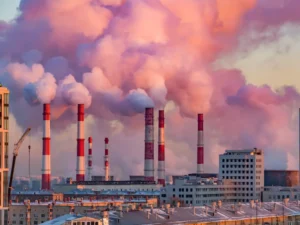A new study published in Nature reveals that five major fossil fuel companies Chevron, ExxonMobil, Saudi Aramco, Gazprom, and BP significantly intensified the 1998 heatwave in India, contributing to massive economic losses and highlighting the direct link between corporate emissions and extreme climate events.

How Big Oil Fueled the 1998 Heatwave
The 1998 heatwave in India, considered the deadliest in half a century, has now been scientifically linked to human-induced climate change. According to researchers from Dartmouth College in the US, emissions from five of the world’s largest oil and gas companies caused a measurable spike in temperatures increasing the intensity of the five hottest days during that period by 0.08°C.
The study found that Chevron alone was responsible for $1.9 billion in damages due to the increased heat. Similar findings tied these companies to subsequent heatwaves in France (2003), Russia (2010), and the US (2012), where the added intensity caused further billions in economic damage $3 billion, $2.8 billion, and $28.8 billion respectively.
Tracing the Emissions Trail
Over the past century, fossil fuel extraction has released vast amounts of greenhouse gases into the atmosphere. Between 1920 and 2020, the cumulative CO₂ emissions from:
- Saudi Aramco reached 16.6 gigatonnes
- Chevron contributed 14.2 gigatonnes
- ExxonMobil added 13.2 gigatonnes
These emissions have fueled global warming, with increasingly frequent and severe heatwaves acting as one of its most dangerous consequences.
To trace this climate damage, researchers developed a model that combines climate simulations with publicly available emissions data, allowing them to estimate how much of each heatwave’s intensity can be attributed to specific companies.
Legal and Economic Implications
The findings are more than just academic. As climate-related lawsuits surge globally with over 100 filed since 2017 this analysis could become key evidence in climate liability cases. The study suggests that investor owned companies like Chevron and ExxonMobil, and state owned firms like Gazprom and Saudi Aramco, are collectively responsible for around $14 trillion in global economic losses due to extreme heat.
In total, the top five emitters are linked to $2.05 trillion in losses (Saudi Aramco), $2 trillion (Gazprom), $1.98 trillion (Chevron), $1.91 trillion (ExxonMobil), $1.45 trillion (BP).
Without emissions from just 111 top polluters, the global economy could be $28 trillion richer, with $9 trillion of that loss tied to the top five firms alone.
Economic Toll of Extreme Heat
Heatwaves don’t just kill they slow down economies:
- GDP per capita in South America, Africa, and Southeast Asia has dropped by over 1% annually due to heat-related disruptions.
- Key sectors like agriculture, manufacturing, and energy are hit hardest, with reduced productivity and increased costs.
- Healthcare systems bear the brunt of heat-related illnesses and deaths.
- Water and power shortages, especially in developing countries, further drag down growth.
Meanwhile, Western economies, home to many of the top emitting companies, have experienced relatively lower economic impacts, underscoring the unequal burden of climate change.
Extreme heat is no longer a future threat it is a present reality fueled by decades of unchecked emissions. As the world warms, holding corporate polluters accountable may be key to not only saving lives but safeguarding the global economy.
